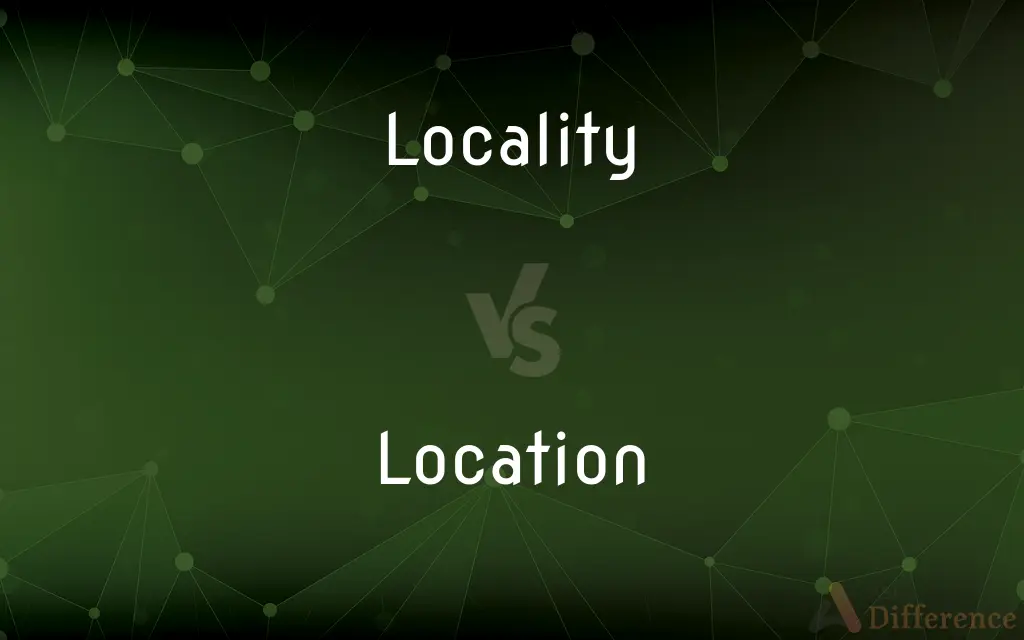Locality vs. Location — What's the Difference?
Edited by Tayyaba Rehman — By Maham Liaqat — Updated on March 4, 2024
Locality refers to a specific area or neighborhood within a larger context, with a sense of community or shared characteristics, while location denotes a specific place or position, often described in terms of coordinates or relative to other places.

Difference Between Locality and Location
Table of Contents
ADVERTISEMENT
Key Differences
Locality is a term that encompasses the social, cultural, and geographical characteristics of a specific area, highlighting the unique aspects and community identity within a broader geographic context. It implies a more nuanced understanding of a place, considering its inhabitants, local culture, and communal activities. On the other hand, location is a more neutral and precise term that identifies a specific point or area in spatial terms. It can refer to any place, from a global position marked by latitude and longitude to a particular address or spot within a larger area, such as the location of a store within a shopping mall.
While locality brings to mind the qualitative and community-related attributes of an area, location focuses on the quantitative and spatial attributes. For example, the locality of Greenwich Village in New York City evokes images of its artistic history, bohemian lifestyle, and distinctive architecture, whereas its location could be described simply as "southwest of Union Square."
The concept of locality often includes a sense of belonging or identity among its residents, underscoring the human aspects and lived experiences of a place. It encompasses not just the physical space but also the social fabric and historical layers that give an area its character. Conversely, location is used in more technical, navigational, or logistical contexts, where the primary concern is identifying where something is or how to get there, without implying any deeper connection to the place's cultural or social dimensions.
In practical applications, locality might be used to discuss the impacts of regional planning, community development, or local governance, focusing on how such activities affect the life and character of a neighborhood or area. Location, however, might be referenced in discussions about real estate, geography, navigation, or logistics, where the emphasis is on spatial relations and physical placement.
Despite their differences, both terms are interconnected; a locality is composed of multiple locations, and every location exists within a locality. The choice between using locality or location often depends on the context of the discussion—whether the focus is on the qualitative aspects and community identity of an area (locality) or its specific spatial characteristics and positioning (location).
ADVERTISEMENT
Comparison Chart
Definition
An area or neighborhood with a sense of community and shared characteristics.
A specific place or position, described in spatial terms.
Focus
Social, cultural, and geographical characteristics.
Spatial and geographical positioning.
Implication
Community identity, human aspects.
Precision, neutrality in spatial terms.
Usage Context
Discussing community, culture, and social aspects.
Navigation, logistics, real estate, and geography.
Examples
Greenwich Village's artistic history.
The coordinates of a monument.
Compare with Definitions
Locality
A place defined by its social and cultural characteristics.
We love our locality for its friendly atmosphere and local markets.
Location
A point on a map.
The app shows your current location.
Locality
A neighborhood or area with its own identity.
The locality of Montmartre in Paris is famous for its bohemian lifestyle.
Location
A spot identified for a specific purpose.
The location for the film shoot offers stunning scenery.
Locality
The setting where community activities occur.
The annual festival takes place in the central locality of the town.
Location
A specific place or position.
The location of the new office is downtown, near the river.
Locality
An area distinguished by specific features or history.
This locality is known for its historic homes and tree-lined streets.
Location
The setting of an event or activity.
The wedding's location is a beach resort.
Locality
A geographic area within a larger context.
The disaster relief efforts focused on the hardest-hit localities.
Location
A place's geographical coordinates.
The explorer shared the location’s latitude and longitude.
Locality
A particular neighborhood, place, or district
"Localities, even individual villages, developed their own languages" (Wall Street Journal).
Location
In geography, location or place are used to denote a region (point, line, or area) on Earth’s surface or elsewhere. The term location generally implies a higher degree of certainty than place, the latter often indicating an entity with an ambiguous boundary, relying more on human or social attributes of place identity and sense of place than on geometry.
Locality
The fact or quality of having position in space.
Location
A particular place or position
The property is set in a convenient location
Locality
An area or district considered as the site of certain activities; a neighbourhood.
Location
(South Africa) An apartheid-era urban area populated by non-white people; township.
Locality
(geography) A built-up area, i.e. a city, town or village
Location
The marking out of the boundaries, or identifying the place or site of, a piece of land, according to the description given in an entry, plan, map, etc
Locality
Position; situation; a place; a spot; esp., a geographical place or situation, as of a mineral or plant.
Location
(Kenya) An administrative region in Kenya, below counties and subcounties, and further divided into sublocations.
Locality
Limitation to a county, district, or place; as, locality of trial.
Location
Situation; place; locality.
Locality
A surrounding or nearby region;
The plane crashed in the vicinity of Asheville
It is a rugged locality
He always blames someone else in the immediate neighborhood
I will drop in on you the next time I am in this neck of the woods
Location
That which is located; a tract of land designated in place.
Location
A determination of the location of something;
He got a good fix on the target
Common Curiosities
How do businesses use location information?
Businesses use location data for marketing, logistics, site selection, and to better understand consumer behavior in different areas.
What is the difference between locality and location?
Locality emphasizes the area's community, culture, and social aspects, whereas location refers to a specific place's spatial and geographical position.
Can a location also be a locality?
Yes, a specific location can be part of a broader locality, which includes the area's cultural and social dimensions.
How do I describe my home using locality and location?
For locality, you might describe the neighborhood's vibe or community; for location, you would give your specific address or coordinates.
Why is understanding locality important in urban planning?
It helps planners consider the community's needs, cultural heritage, and social dynamics, ensuring development respects and enhances the area's character.
How do geographers use the terms locality and location?
Geographers use locality to discuss areas with specific cultural or social characteristics and location for precise spatial analysis and mapping.
How does locality influence social relationships?
The characteristics of a locality, such as its communal spaces and social activities, can foster closer relationships among residents.
Is locality more important than location?
Importance varies by context; locality is crucial for community identity and social aspects, while location is key for navigation and spatial analysis.
Can the terms locality and location be used interchangeably?
While related, they are not interchangeable due to their differing emphases on community characteristics versus spatial positioning.
Why might a business choose its location based on locality?
A business might choose a location within a certain locality to align with its brand image, target demographic, or to be part of a vibrant community.
What is the significance of location in environmental studies?
Location is crucial for understanding environmental conditions, resources, and challenges specific to different areas for conservation and management.
What role does location play in logistics?
In logistics, location is critical for optimizing routes, warehousing, and distribution strategies to ensure efficiency and cost-effectiveness.
How does the concept of locality affect real estate?
Real estate values can be influenced by the characteristics of the locality, such as its desirability, community feel, and cultural amenities.
How can locality and location affect one's lifestyle?
The locality can influence lifestyle through its culture, amenities, and community, while the location can affect daily commutes, access to services, and environmental quality.
What tools are used to determine location?
Tools include GPS devices, maps, geolocation services on smartphones, and geographic information systems (GIS) for detailed spatial analysis.
Share Your Discovery

Previous Comparison
Choose vs. Opt
Next Comparison
Peasant vs. NobleAuthor Spotlight
Written by
Maham LiaqatEdited by
Tayyaba RehmanTayyaba Rehman is a distinguished writer, currently serving as a primary contributor to askdifference.com. As a researcher in semantics and etymology, Tayyaba's passion for the complexity of languages and their distinctions has found a perfect home on the platform. Tayyaba delves into the intricacies of language, distinguishing between commonly confused words and phrases, thereby providing clarity for readers worldwide.














































